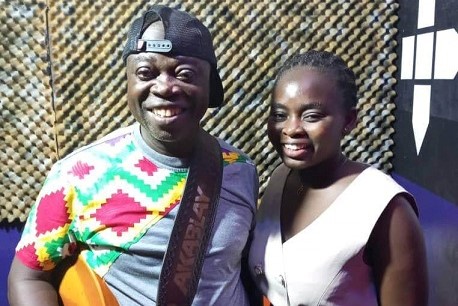![]()

Naana Blu brings shine to new Ama soundtrack
Her pleasant voice caressed the lyrics as she occasionally threw her head back and closed her eyes, as if those actions gave her better command over what she was doing.
Singer Naana Blu was in a recording studio in Accra to add her own special touch to the soundtrack of Ama, a film originally co-directed by Kwesi Owusu and Kwate Nee-Owoo in 1991 but which is being re-released and would make its world premiere at this year’s New York African Film Festival on May 25.
What is going to New York is referred to in film parlance as a Director’s Cut. The storyline remains the same but there are a few tweaks here and there to prop it up for present-time viewers.
Ama’s soundtrack was key to the original film. The title track was hugely popular. It brought attention to the film and emphasised the strong relationship between film and music.
When the film’s co-directors asked some music industry insiders here to recommend a female voice to sing on the revamped title track, the name that constantly popped up was Naana Blu. They agreed she would be the ideal choice because apart from her fluid voice, the song’s lyrics, written by Kwesi Owusu, are in Fante and perfect for Naana Blu to render.
The original song had a soca feel but this time around, a danceable, fast tempo Highlife was opted for. Well-known guitarist/singer Akablay handled the arrangements. The man is a longstanding. Highlife star and he responded promptly when he was contacted to handle the production. He saw the Ama film when it first came out and was happy to make a contribution to it this time around.
“It was a delight working with Naana Blu on the Ama soundtrack. I’m one of her big fans and we might even collaborate on something of our own pretty soon,” Akablay said.
The film tells the story of an irrepressible 11-year-old, Ama, and her family’s struggle to acknowledge and come to terms with ancestral visitation and prophecy. The cast includes Anima Misa, Alexandra Duah, Evans Nii Omar Hunter, Georgina Ackerman, Thomas Baptiste, Eddie Tagoe, Roger Griffiths and the Adzido Pan African Dance Ensemble.
So Naana Blu’s Ama rendition opens the Director’s Cut. She’s obviously one of Ghana’s fastest-rising music stars who has a large following on TikTok. Many music fans became aware of her when she scored a hit with the cover version of Kofi Kinaata’s Things Fall Apart by. She’s since then come out with several notable pieces like Kwame Ato, You Go Miss Me, You Dey Do Yourself, Happy Birthday and This is Highlife.

The film’s directors put out an an eight-track album of songs from the original film. In addition to the Ama song, the other pieces were So Great (To Be in Love), Treat Me Right, This is African Time, Kpanlogo, Swing, Brother Joe and Aladura.
Performers on those tracks included Pauline Oduro and Billie Richardson (vocals), Vico Mensah (guitar, bass and keyboards), Ray Ekow Otoo Allen (saxophone), Lindell Lewis (keyboards), Zimi Zeko (guitar) and the Adzido Dance Company.
An album of songs from the Director’s Cut will be released. It is expected to feature some of the original material as well as a mixture of top artistes and exciting new discoveries on the Ghanaian scene. The film’s directors say “it will be hot with exciting covers.”
Though Ama was originally made 32 years ago, it can also be considered as a new film for the vast majority of contemporary audiences!
“Film technology has moved on since the film was made so technically, we’ve had to enhance things in a number of ways,” says Kwesi Owusu. “With drones, one can do a lot more so in the beginning of the film now, we have introduced some eye-catching drone shots,” says Kwesi Owusu.
“We have also introduced more shots which generally enhance the drama in the film in many ways. The London Carnival sequence is more vibrant. As directors, we’ve gone through the film carefully to see where to add or subtract and are happy with the result.”
His view is that there are issues raised in the film that are still relevant and would resonate with modern-days viewers.
“I remember when the film was shown in Accra in 1991, there was this big debate about whether our ancestors would talk to us through computers if they want to communicate with us. What we are saying is that our ancestors are contemporary. They are not locked up and frozen in a museum.”
Apart from the New York African Film Festival, the film’s directors say it will show as a cinematic companion to the DanceAfrica Celebration in New York which showcases the best new narrative, documentary, and short films from across Africa and diaspora, with a special focus on films from and about Ghana. There are also requests from other film festivals around the world to include it in their programming.
The new Ama film will be shown in Ghana later this year.
